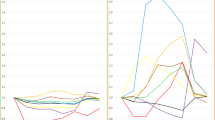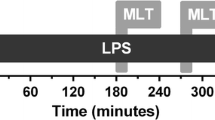Abstract
Objective
To test the dose response effect of infused fish oil (FO) rich in n-3 PUFAs on the inflammatory response to endotoxin (LPS) and on membrane incorporation of fatty acids in healthy subjects.
Design
Prospective, sequential investigation comparing three different FO doses.
Subjects
Three groups of male subjects aged 26.8 ± 3.2 years (BMI 22.5 ± 2.1).
Intervention
One of three FO doses (Omegaven®10%) as a slow infusion before LPS: 0.5 g/kg 1 day before LPS, 0.2 g/kg 1 day before, or 0.2 g/kg 2 h before.
Measurements and results
Temperature, hemodynamic variables, indirect calorimetry and blood samples (TNF-α, stress hormones) were collected. After LPS temperature, ACTH and TNF-α concentrations increased in the three groups: the responses were significantly blunted (p < 0.0001) compared with the control group of the Pluess et al. trial. Cortisol was unchanged. Lowest plasma ACTH, TNF-α and temperature AUC values were observed after a single 0.2 g/kg dose of FO. EPA incorporation into platelet membranes was dose-dependent.
Conclusions
Having previously shown that the response to LPS was reproducible, this study shows that three FO doses blunted it to various degrees. The 0.2 g/kg perfusion immediately before LPS was the most efficient in blunting the responses, suggesting LPS capture in addition to the systemic and membrane effects.


Similar content being viewed by others
References
Calder PC (2004) N-3 fatty acids, inflammation, and immunity–relevance to postsurgical and critically ill patients. Lipids 39:1147–1161
Calder PC (2008) The relationship between the fatty acid composition of immune cells and their function. Prostaglandins Leukot Essent Fatty Acids 79:101–108 Epub 2008 Oct 2023
Yaqoob P, Pala HS, Cortina-Borja M, Newsholme EA, Calder PC (2000) Encapsulated fish oil enriched in alpha-tocopherol alters plasma phospholipid and mononuclear cell fatty acid compositions but not mononuclear cell functions. Eur J Clin Invest 30:260–274
Pluess TT, Hayoz D, Berger MM, Tappy L, Revelly JP, Michaeli B, Carpentier YA, Chiolero RL (2007) Intravenous fish oil blunts the physiological response to endotoxin in healthy subjects. Intensive Care Med 33:789–797
Simoens C, Richelle M, Rossle C, Derluyn M, Deckelbaum RJ, Carpentier YA (1995) Manipulation of tissue fatty acid profile by intravenous lipids in dogs. Clin Nutr 14:177–185
Livesey G, Elia M (1988) Estimation of energy expenditure, net carbohydrate utilization, and net fat oxidation and synthesis by indirect calorimetry: evaluation of errors with special reference to detailed composition of fuels. Am J Clin Nutr 47:608–628
Katan MB, Deslypere JP, van Birgelen AP, Penders M, Zegwaard M (1997) Kinetics of the incorporation of dietary fatty acids into serum cholesteryl esters, erythrocyte membranes, and adipose tissue: an 18-month controlled study. J Lipid Res 38:2012–2022
Calder PC, Bond JA, Harvey DJ, Gordon S, Newsholme EA (1990) Uptake and incorporation of saturated and unsaturated fatty acids into macrophage lipids and their effect upon macrophage adhesion and phagocytosis. Biochem J 269:807–814
Wanten GJ, Calder PC (2007) Immune modulation by parenteral lipid emulsions. Am J Clin Nutr 85:1171–1184
Finnegan YE, Minihane AM, Leigh-Firbank EC, Kew S, Meijer GW, Muggli R, Calder PC, Williams CM (2003) Plant- and marine-derived n-3 polyunsaturated fatty acids have differential effects on fasting and postprandial blood lipid concentrations and on the susceptibility of LDL to oxidative modification in moderately hyperlipidemic subjects. Am J Clin Nutr 77:783–795
Simoens CM, Deckelbaum RJ, Massaut JJ, Carpentier YA (2008) Inclusion of 10% fish oil in mixed medium-chain triacylglycerol-long-chain triacylglycerol emulsions increases plasma triacylglycerol clearance and induces rapid eicosapentaenoic acid (20:5n-3) incorporation into blood cell phospholipids. Am J Clin Nutr 88:282–288
Carpentier YA, Peltier S, Portois L, Sener A, Malaisse WJ (2008) Rapid lipid enrichment in omega3 fatty acids: plasma data. Int J Mol Med 21:355–365
Singer P, Shapiro H, Theilla M, Anbar R, Singer J, Cohen J (2008) Anti-inflammatory properties of omega-3 fatty acids in critical illness: novel mechanisms and an integrative perspective. Intensive Care Med 34:1580–1592
Mascioli EA, Babayan VG, Bistrian BR, Blackburn GL (1988) Novel triglycerides for special medical purposes. J Parenter Enteral Nutr 12:127S–132S
Pscheidl E, Schywalsky M, Tschaikowsky K, Böke-Pröls T (2000) Fish oil-supplemented parenteral diets normalize splanchnic blood flow and improve killing of translocated bacteria in a low-dose endotoxin rat model. Crit Care Med 28:1489–1496
Michaeli B, Berger MM, Revelly JP, Tappy L, Chioléro R (2007) Effects of fish oil on the neuro-endocrine responses to an endotoxin challenge in healthy volunteers. Clin Nutr 26:70–77
Feingold KR, Funk JL, Moser AH, Shigenaga JK, Rapp JH, Grunfeld C (1995) Role for circulating lipoproteins in protection from endotoxin toxicity. Infect Immun 63:2041–2046
Acknowledgments
We are grateful to Prof. Yvon Carpentier and his team (NUTRISUB Laboratory ULB, Brussels, Belgium) for the determinations of the fatty acid membrane incorporation and to Dr. Christiane Ruffieux and Pierre Bady (Institute of Social and Preventive Medicine, University of Lausanne) for statistical advice. The study was primarily supported by a grant from the Swiss National Science Foundation (no. 32-61582.00) and completed by a partial grant from Fresenius Kabi AG (Bad Homburg, Germany) for laboratory determinations.
Conflict of interest statement
None of the authors has any conflict of interest, such as bonds, or any economic implications in the industry. R.L. Chiolero and M.M. Berger deliver invited lectures for Fresenius Kabi AG, B. Braun and Nestlé. The groups research is partially supported by grants from Fresenius Kabi AG and B. Braun.
Author information
Authors and Affiliations
Corresponding author
Rights and permissions
About this article
Cite this article
Pittet, Y.K., Berger, M.M., Pluess, TT. et al. Blunting the response to endotoxin in healthy subjects: effects of various doses of intravenous fish oil. Intensive Care Med 36, 289–295 (2010). https://doi.org/10.1007/s00134-009-1689-8
Received:
Accepted:
Published:
Issue Date:
DOI: https://doi.org/10.1007/s00134-009-1689-8




